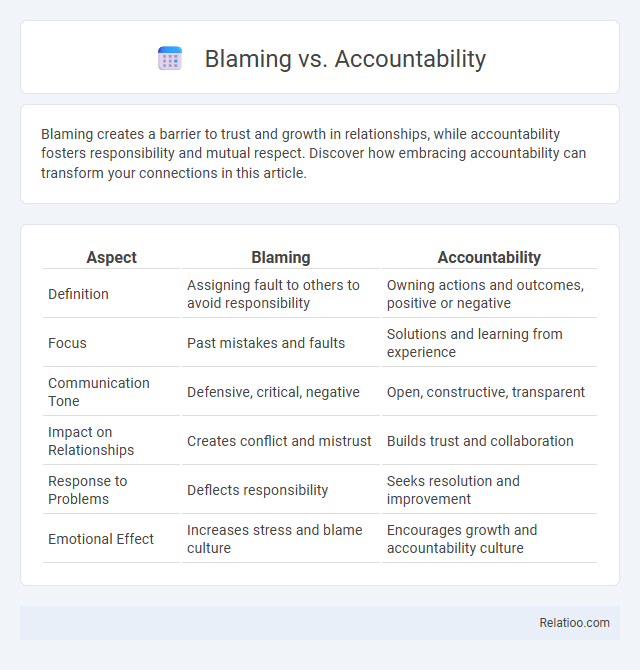Blaming creates a barrier to trust and growth in relationships, while accountability fosters responsibility and mutual respect. Discover how embracing accountability can transform your connections in this article.
Table of Comparison
| Aspect | Blaming | Accountability |
|---|---|---|
| Definition | Assigning fault to others to avoid responsibility | Owning actions and outcomes, positive or negative |
| Focus | Past mistakes and faults | Solutions and learning from experience |
| Communication Tone | Defensive, critical, negative | Open, constructive, transparent |
| Impact on Relationships | Creates conflict and mistrust | Builds trust and collaboration |
| Response to Problems | Deflects responsibility | Seeks resolution and improvement |
| Emotional Effect | Increases stress and blame culture | Encourages growth and accountability culture |
Understanding the Difference: Blaming vs Accountability
Understanding the difference between blaming and accountability is crucial for fostering a productive environment. Blaming shifts responsibility and focuses on fault, while accountability emphasizes owning actions and learning from outcomes to improve performance. Your ability to embrace accountability over blaming encourages growth, trust, and effective problem-solving.
The Psychological Impact of Blame
Blaming creates a toxic environment that fosters defensiveness, stress, and decreased motivation, impacting mental well-being and interpersonal relationships. Accountability promotes psychological safety by encouraging responsibility, growth, and constructive problem-solving without fear of judgment. You can improve emotional resilience and team dynamics by shifting focus from blaming to accountability.
Why Accountability Drives Growth
Accountability drives growth by fostering a culture where individuals take ownership of their actions and learn from mistakes instead of placing blame. When you focus on accountability, teams develop trust, improve collaboration, and enhance problem-solving skills, leading to increased productivity and innovation. Emphasizing accountability over blaming creates a positive environment that empowers continuous development and organizational success.
The Role of Communication in Accountability
Effective communication is essential in fostering accountability by clearly defining expectations, responsibilities, and feedback channels, which helps prevent the destructive cycle of blaming. Transparent and constructive dialogue encourages ownership of actions and solutions, enhancing trust and collaboration within teams. Miscommunication or lack of feedback often leads to blame-shifting, undermining accountability and overall organizational performance.
Blame Culture: Signs and Consequences
Blame culture is characterized by constant finger-pointing, avoidance of responsibility, and a lack of trust within teams, leading to decreased morale and productivity. Signs include defensiveness, reluctance to admit mistakes, and a focus on assigning fault rather than solving problems. Your awareness of these patterns allows you to foster accountability, encouraging ownership and continuous improvement instead of perpetuating harmful blame dynamics.
Building Accountability in Teams
Building accountability in teams requires shifting the focus from blaming individuals to fostering responsibility for actions and outcomes. Emphasizing clear expectations, open communication, and constructive feedback helps create a culture where your team members own their work and collaborate effectively. Developing trust and transparency drives improved performance and collective problem-solving without resorting to blame.
Transforming Blame into Constructive Feedback
Transforming blame into constructive feedback involves shifting the focus from assigning fault to identifying actionable solutions that foster growth and improvement. Emphasizing accountability encourages ownership of actions and promotes a culture of transparency, where mistakes are seen as opportunities for learning rather than reasons for punishment. This approach enhances team collaboration, builds trust, and drives continuous performance development by addressing issues with clarity and empathy.
Leadership’s Influence on Accountability
Leadership directly shapes organizational accountability by modeling transparency and responsibility, which encourages your team to own their actions and outcomes. Effective leaders create a culture where mistakes are seen as learning opportunities rather than occasions for blame, fostering trust and continuous improvement. This influence reduces the tendency to blame others and strengthens commitment to shared goals and collective success.
Tools and Strategies to Promote Accountability
Effective tools and strategies to promote accountability include clear goal-setting platforms such as OKR software, regular performance tracking systems, and transparent communication channels that facilitate feedback and responsibility sharing. Implementing structured accountability frameworks like RACI matrices helps delineate roles, minimizing misplaced blaming by clarifying ownership of tasks and outcomes. Training programs aimed at emotional intelligence and conflict resolution further foster a culture where accountability thrives over blaming, enhancing team cohesion and productivity.
Creating a Positive, Accountability-Focused Environment
Creating a positive, accountability-focused environment requires shifting from blaming individuals to fostering responsibility and learning from mistakes. You can encourage open communication, emphasize solutions, and recognize efforts to build trust and motivation. This approach enhances team collaboration, drives continuous improvement, and supports personal and organizational growth.

Infographic: Blaming vs Accountability
 relatioo.com
relatioo.com